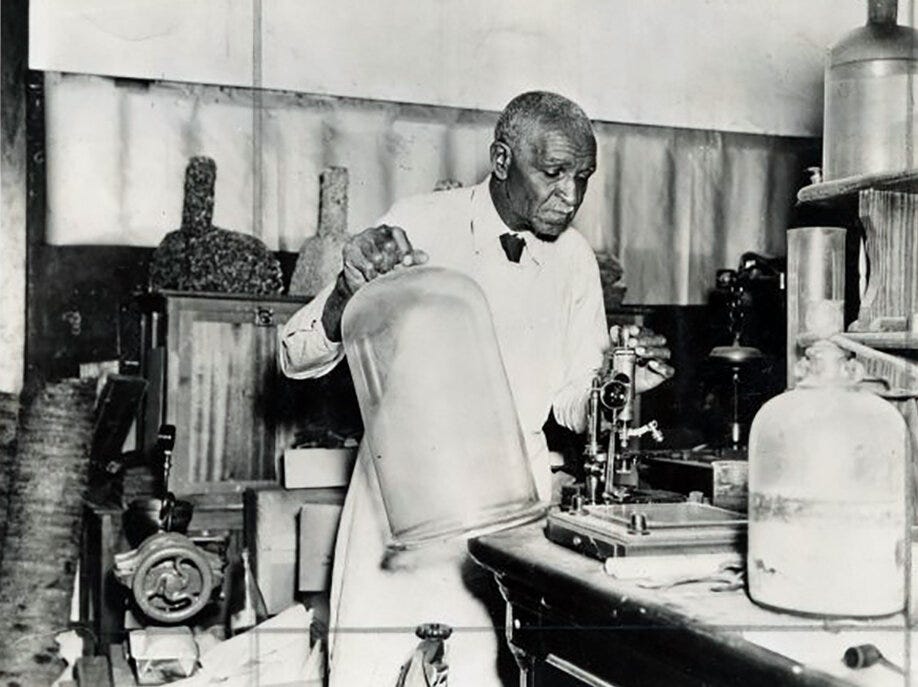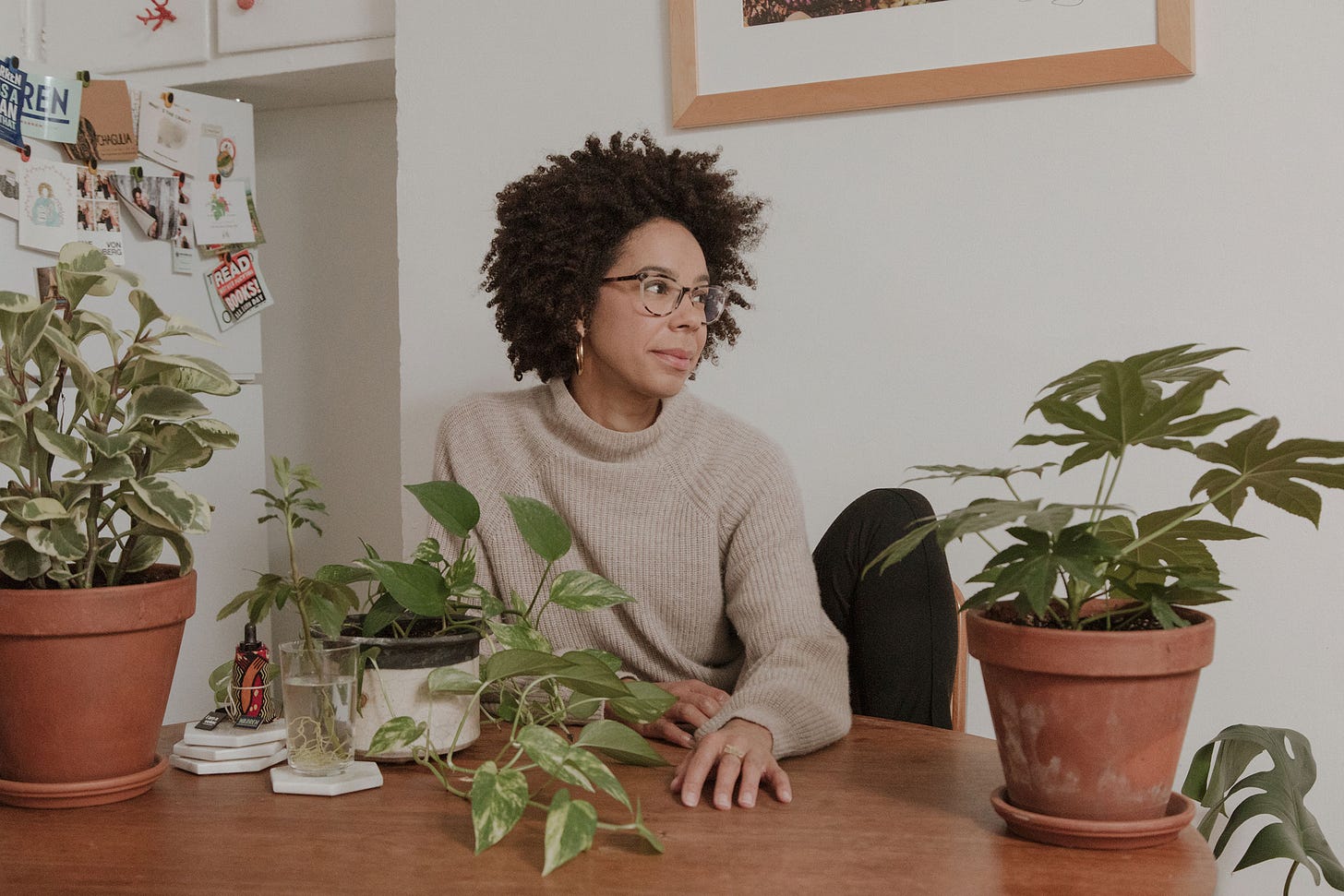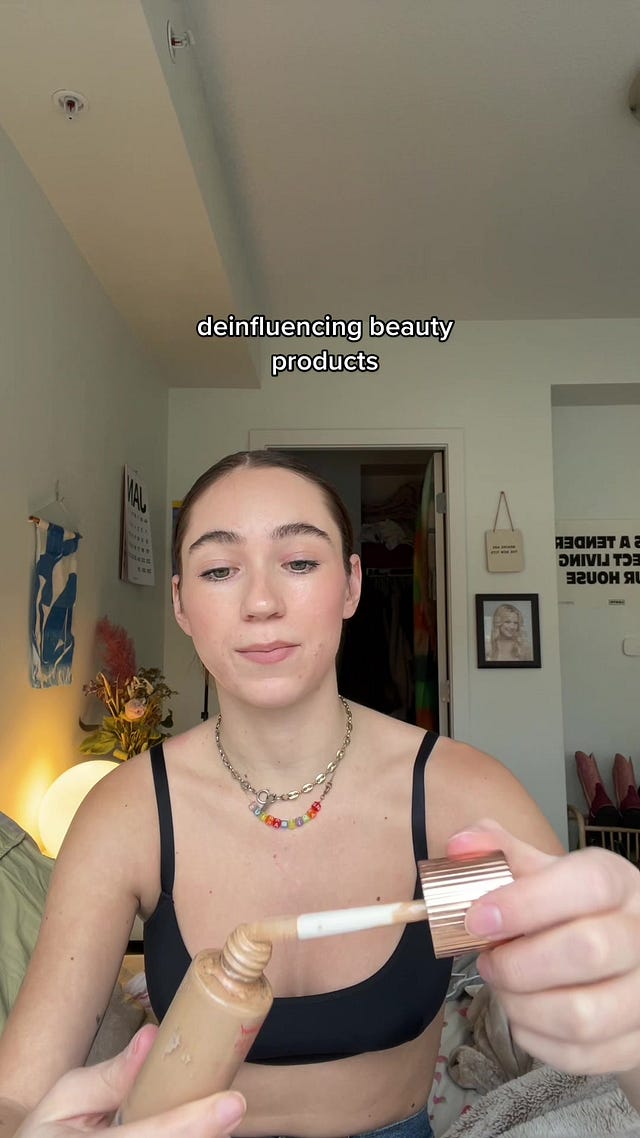Hi again! New week, new issue. :) Prepare for a good one, but first; here in the northern hemisphere, our winter has turned into more of a spring… it’s another daunting reality of the presence of climate change, but I’m thinking we should appreciate the mild weather (last week was 40s-60s Farenheit) and not let it break us down, as it’s a good time for spreading awareness, mitigation and action. It has definitely improved my mood, and 50s truly are the perfect running weather. What do you think? Are you facing similar false seasons? Comment below!
Black environmentalists to honor this month!
George Washington Carver, 1864-1943
He was an agricultural researcher and dedicated scientist who rose from slavery, educating farmers on crop rotation and yield. He moved the South away from its heavy reliance on cotton to biodiverse plants like peanuts, sweet potatoes and soybeans, all of which replenish farmland. (Bluegrass Institute)
This month, thank Carver everytime you enjoy a peanut (or peanut product), which helps keep soil in better health!
MaVynee Betsch, “The Beach Lady” 1935-2005
Great-granddaughter of Florida’s first Black millionaire, A. L. Lewis, Betsch was a passionate environmentalist, sacrificing her opera career to become a philanthropist.
She is most commonly known for preserving American Beach, one of the few beaches available to African-Americans during the Jim Crow era. Thanks to her work, the National Park Serviced added American Beach to its National Register of Historic Places in 2002.
After selling her home, she was referred to as “Beach Lady” for sleeping in a chair on the beach.
Despite all of this, she remains largely disregarded today. (Grist)
Wangari Maathai, 1940-2011
Kenyan scholar who founded the Green Belt Movement in 1977, which restores local ecosystems, supports environmental policies, raise awareness, and create climate resilient communities. They’ve also planted 51 million trees to date.
She was the first woman in East and Central Africa to earn a doctorate degree, and the first African woman to win 2004 Nobel Peace Prize, and was awarded with several others throughout the years.
“In December 2002, Professor Maathai was elected to parliament with an overwhelming 98% of the vote. She was subsequently appointed by the president, as Assistant Minister for Environment, Natural Resources and Wildlife in Kenya’s ninth parliament” (Nobel Prize).
Leah Thomas, Intersectional Environmentalist
Activist, launched the non-profit Intersectional Environmentalist, & author of The Intersectional Environmentalist: How to Dismantle Systems of Oppression to Protect People + Planet, and public speaker.
“Named to several notable lists—including TIME100 NEXT, INSIDER’s Climate Action 30, Marie Claire’s Creators to Watch, EBONY Power 100, and InStyle’s The Badass 50—and is an established public speaker who has presented at Google, 1% for the Planet’s Global Summit, Dreamforce, and more” (GreengirlLeah).
Check out her podcast, The Joy Report, and her Instagram @greengirlleah to learn more!
Dr. Ayana Elizabeth Johnson, Marine Biologist
Known for How to Save a Planet (co-creator) and All We Can Save (co-edited with Dr. Katharine K. Wilkinson, one of the best books I read last year! Truly inspiring essays from women of all backgrounds), and the Urban Ocean Lab.
“Dr. Johnson serves on the board of directors for Patagonia and GreenWave, on the advisory boards of Environmental Voter Project and Scientific American, and on the steering committee for the Ocean Justice Forum. Recent recognitions include, the Schneider Award for climate communication, the Time 100 Next List, and appointment to the Secretary of State’s Foreign Affairs Policy Board” (AyanaElizabeth.com).
Her first fish trap invention that reduced bycatch won the Rare/National Geographic Solution Search.
These inspirational individuals are just a fraction of environmentalists fighting against climate change, social injustice, and so much more. Who inspires you? Share in the comments!
De-influencing: the trend we should pay attention to
To counter the mania that are influencers, TikTok, fast fashion, and hyperconsumption in general, there is a new trend - also viral from TikTok - gripping the media. There seems to be a new trend almost daily, as Meredith Holser from Brit + Co explains,
Take last year’s Ugg Mini surge for example. The low-rise boot was pretty much everywhere I went (and scrolled). It was all the rage, and cozy outfits didn't seem complete without them. “This is your sign to get the Ugg Minis,” one creator preached. “You need these boots in your life,” another said. And this went on and on. It felt like everyone had the shoes, and I definitely contemplated grabbing myself a pair, cycling between adding them to my cart and taking them out a few days later. They’re expensive, I told myself, but I would be dressing like that one cool influencer. It sounds shallow, but it was hard not to feel like I was part of a trend – something bigger than myself – and I know others that feel the same way.
(De-Influencing Is TikTok's Latest Anti-Trend. Here's Why It's Going Viral)
Today, every TikTok creator seems to be hopping on this trend, sharing makeup, skincare and many other products they don’t recommend, a benefit to our possible impending recession.
theSkimm suggests these tips to avoid being influenced:
Be aware of how you (and the people you follow) talk about products. “We talk about them in very extreme, polarizing ways,” said Pritchard. “We say things like, ‘This changed my life…I'm absolutely obsessed.’” Even though it might seem harmless, “You'll notice when you hear things like that, your brain will start to kind of go haywire in a sense,” she explained. Which makes us feel like we need a certain product even more.
Be mindful of the items you want. Anytime you want something, add it to a listand wait at least 24 hours before add it to your cart. Ainsley note: I’ve heard a month, which I personally believe to be a better prevention! “[This] allows your brain to have a cool off period,” said Pritchard. And it extends the period of anticipation of getting something new, which Pritchard says is often more exciting than actually having the product itself. If you want to take things a step further, write down how much each item costs. You'd be surprised how quickly it adds up.
Create “personal boundaries” around your shopping habits. Pritchard’s example: Don’t buy another makeup or skincare product before you run out of the one you’re using. “It's this practice of using all of your products, which obviously saves you a ton of money and it really reduces the amount of junk and clutter that you have in your environment,” she said.
Here’s one example of de-influencing beauty products, mentioned in the LA Times.
Wrap up
Hope you learned something new!












I love learning about these amazing environmentalists in this issue- thank you! Washington Carver was always an amazing person I loved to teach my students about every year as a Montessori teacher of 6-9 year olds. His is a fantastic story and inspiring. The others I am excited to learn about today! So, thank you!